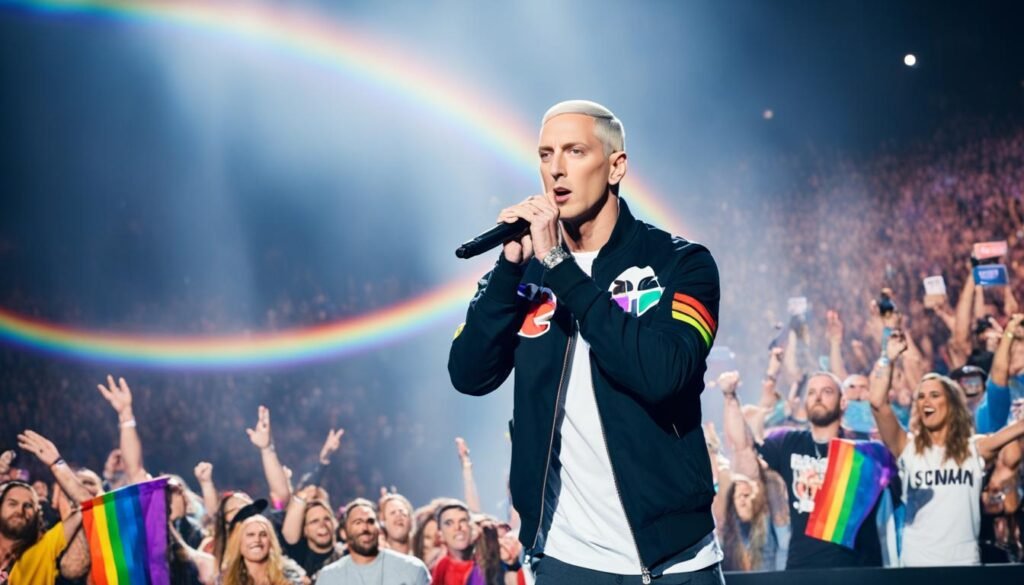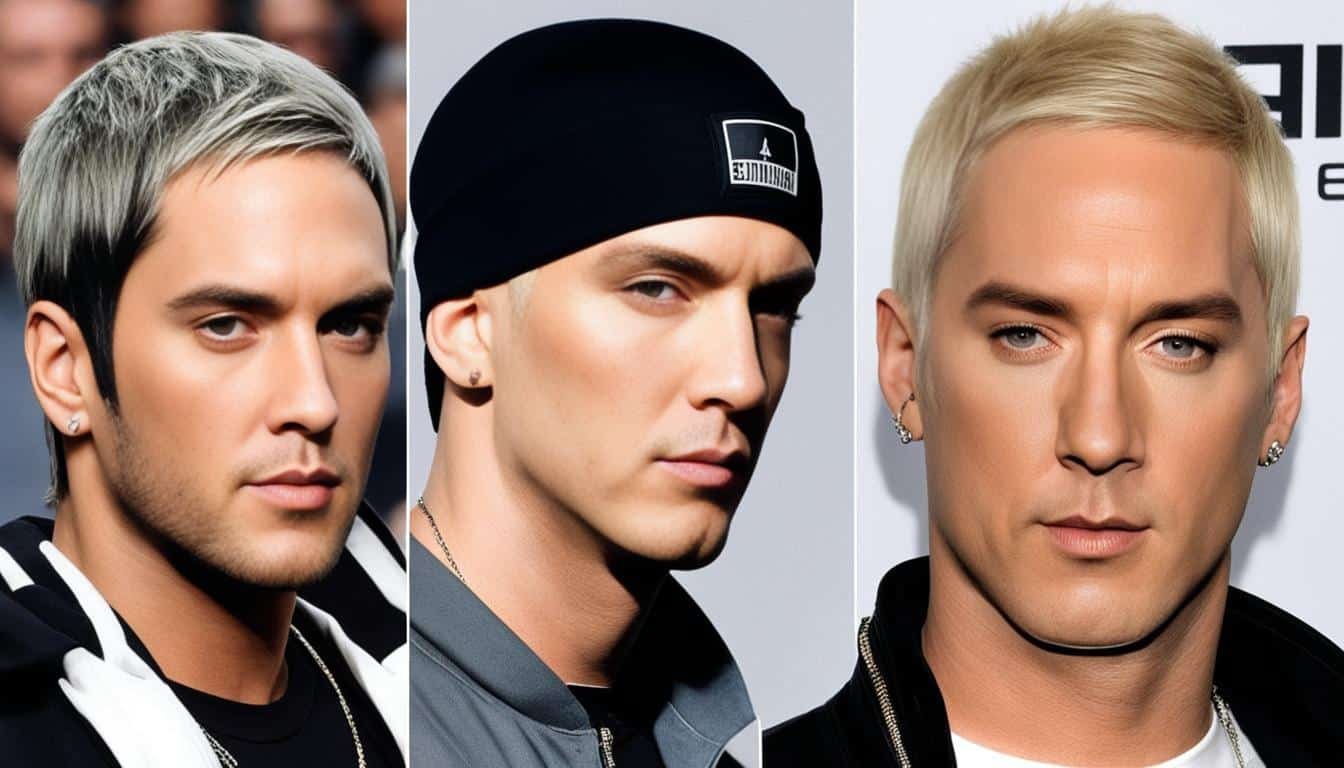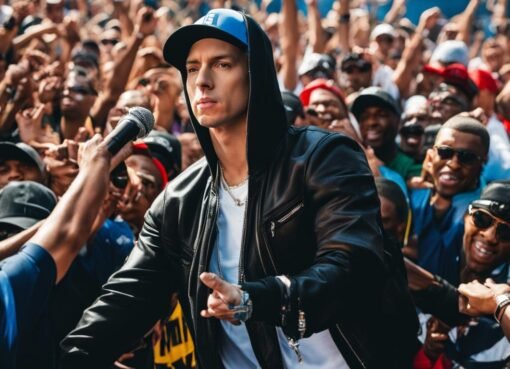What if I Was Gay, Eminem?

Explore the controversial lyrics and LGBTQ themes in the leaked collaboration between Joyner Lucas and Eminem. Dive into the conversation about identity, queer representation, and the importance of inclusivity in music.
The Controversy Surrounding “What if I Was Gay”
Eminem’s verse in the leaked collaboration “What if I Was Gay” has ignited a fiery debate in the music industry. The controversy revolves around potential homophobic undertones in the lyrics, prompting listeners to question Eminem’s stance on supporting the LGBTQ community.
It’s essential to note that “What if I Was Gay” is a fictional narrative and does not necessarily reflect Eminem’s personal beliefs. However, his choppy delivery and the nature of the lyrics have raised concerns among fans and critics alike.
This controversy has shed light on the ongoing discussion surrounding queer representation in music. As artists, there is a responsibility to foster inclusivity and acceptance within the industry. Some argue that Eminem’s past use of homophobic slurs and provocative lyrics contradicts this notion, while others believe that his involvement in this collaboration is a step towards promoting understanding and queer representation.
Eminem’s creative choices and the reception of his work invite dialogue on the importance of LGBTQ visibility and acceptance in music. By addressing and challenging societal norms, artists like Eminem contribute to a more diverse and inclusive music landscape.
Leaked Alternate Version of the Track
A leaked alternate version of “What if I Was Gay” by Joyner Lucas and Eminem recently surfaced, causing a stir among fans. This version features a slightly different verse from Eminem, adding a twist to the ending of his original delivery. However, what remains unchanged is the absence of the hook recorded by Skylar Grey for the song.
The leaks and rumors surrounding this alternate version have sparked speculation and generated intense discussion among fans. Many are curious about the intentions behind these changes and what they might reveal about Eminem’s stance on gay rights and LGBTQ themes in his music.
Eminem’s Impact on LGBTQ Representation in Music
Over the years, Eminem has faced criticism for his use of homophobic slurs and controversial lyrics that some perceive as promoting hate speech. However, it is essential to acknowledge that artists and their work can evolve. Eminem has shown growth and a willingness to address societal issues in his more recent music, including the exploration of LGBTQ themes. While his older songs may not have portrayed acceptance or inclusivity, his involvement in “What if I Was Gay” suggests a shift towards greater understanding and representation.
Eminem’s journey towards embracing LGBTQ representation in his music reflects the evolving landscape of acceptance and diversity in the industry. As a prominent figure in hip-hop, his involvement in the song signifies an important step forward in promoting queer voices and experiences. By openly exploring LGBTQ themes, Eminem helps to amplify the stories and struggles of the queer community, making them more visible and relatable to a wider audience.
In recent years, there has been a growing demand for greater representation and inclusivity in the music industry. Artists like Eminem have the power to influence cultural conversations and challenge preconceptions about identity, acceptance, and equality. By addressing LGBTQ themes in his music, Eminem not only promotes understanding and empathy but also encourages listeners to question their own beliefs and biases.
The Evolution of Eminem’s Music
Eminem’s journey towards LGBTQ representation in his music is evident in the evolution of his lyrics and themes. While his earlier work may have been criticized for its use of derogatory language, his more recent releases demonstrate a shift towards a more inclusive and accepting perspective.
Through his collaboration with Joyner Lucas on “What if I Was Gay,” Eminem showcases a willingness to engage with LGBTQ themes and narratives. The song serves as a platform for exploring the complexities of identity, challenging societal norms, and advocating for acceptance within the LGBTQ community. By openly addressing these issues, Eminem contributes to a broader movement within the music industry to promote equality and representation.
It is important to recognize that artists are not static; they grow and evolve, and their work reflects this evolution. Eminem’s involvement in “What if I Was Gay” signals a shift towards greater acceptance and understanding, indicating that even the most controversial artists can contribute to positive change within the cultural landscape.

Throughout his career, Eminem’s impact on the music industry has been undeniable. From his controversial beginnings to his more recent exploration of LGBTQ themes, he has transformed the way we think about hip-hop and its potential for promoting inclusivity and acceptance. While there is still much progress to be made, artists like Eminem serve as advocates for change and pave the way for a more diverse and inclusive future.
The Importance of LGBTQ Representation in Music
The inclusion of LGBTQ representation in music is crucial for promoting visibility, acceptance, and equality. Songs like “What if I Was Gay” by Joyner Lucas and Eminem have sparked important conversations about the LGBTQ community and challenged societal norms and stereotypes. By featuring LGBTQ perspectives in their music, artists can play an essential role in providing a platform for marginalized voices and contributing to a more inclusive and diverse music industry.
Artists like Eminem have faced criticism in the past for their use of homophobic slurs and controversial lyrics. However, it is important to recognize that artists can grow and evolve over time. Eminem’s involvement in “What if I Was Gay” suggests a shift towards greater understanding and representation. By addressing LGBTQ themes in his music, Eminem and other artists not only foster inclusivity, but also help to raise awareness and promote acceptance of the LGBTQ community.
Music has the power to influence and inspire change. When artists support the LGBTQ community and advocate for their rights through their music, they become catalysts for progress. LGBTQ representation in music provides a means for individuals to feel seen and accepted, breaking down barriers and challenging discrimination. It is important for artists to continue embracing and amplifying LGBTQ voices, ultimately creating a more inclusive society where everyone’s experiences and identities are acknowledged and celebrated.
FAQ
What is the leaked collaboration between Joyner Lucas and Eminem titled "What if I Was Gay" about?
The leaked collaboration explores LGBTQ themes and challenges preconceptions about identity. Joyner Lucas shares his perspective as someone coming out as gay to his best friend, while Eminem takes on the role of the friend, expressing either homophobia or unsupportiveness.
Did Eminem’s verse in "What if I Was Gay" spark controversy?
Yes, Eminem’s verse sparked controversy due to its potentially homophobic undertones. Some listeners criticized his delivery and questioned his support for the LGBTQ community.
Was the leaked collaboration meant to be included on Joyner Lucas’ album?
Yes, the leaked collaboration was initially intended to be included on Joyner Lucas’ ADHD project but was ultimately removed from the album.
Has there been a leaked alternate version of "What if I Was Gay"?
Yes, a leaked alternate version of the track recently surfaced, featuring a slightly different verse from Eminem. However, it still does not include the hook recorded by Skylar Grey.
Has Eminem faced criticism for his portrayal of LGBTQ themes in his music?
Yes, over the years, Eminem has faced criticism for his use of homophobic slurs and controversial lyrics that some perceive as promoting hate speech.
Has Eminem shown growth and a willingness to address societal issues in his more recent music?
Yes, Eminem has shown growth and a willingness to address societal issues in his more recent music, including the exploration of LGBTQ themes.
How important is LGBTQ representation in music?
LGBTQ representation in music is crucial for promoting visibility, acceptance, and equality. It provides a platform for marginalized voices and contributes to a more inclusive and diverse music industry.




Leave a Comment